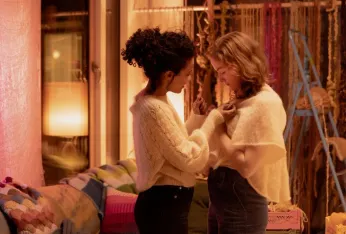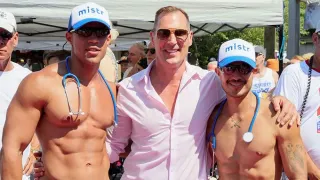
Sep 8
In Norway, A Trilogy of Films Talk About "Sex," "Dreams," and "Love"
C.J. Prince READ TIME: 2 MIN.
In 2024, Norwegian filmmaker and novelist Dag Johan Haugerud quickly established himself on the international film scene with films modest in appearance yet highly ambitious with their aims. Set in modern day Oslo, Haugerud writes and directs a trilogy with no narrative connections. Instead, all three are linked together through a common theme of desire, as reflected in its single word titles: “Sex,” “Dreams,” and “Love.” In Norway, the films arrived in that order. For its US release, distributor Strand Releasing opted to put “Love” out first, followed by “Sex” and finally “Dreams,” which opens this weekend in New York City. To make things more convoluted, the trilogy initially premiered out of its original order: “Sex” played at Berlin in 2024, “Love” premiered in competition at Venice last fall, and “Dreams” competed at Berlin in February 2025, where the festival jury – presided over by queer filmmaking icon Todd Haynes – gave the film the festival’s top prize.
At the top of Haugerud’s mind is how much contemporary sentiments around sexuality have changed in recent decades, with an openness and acceptance towards identities and perspectives that have long been excluded for not conforming to the norms of a heteronormative, patriarchal society. This gets tackled head on in “Sex,” where we watch two male chimney sweeps grapple with queerness in their own respective ways. Both men have wives and children, and their antiquated profession can be taken as a symbol of how their privileged, insulated way of life aligns with an old social order.
The first chimney sweep (Thorbjørn Harr) confesses that he has recurring dreams where he meets David Bowie, and he describes the way Bowie looks at him as making him feel like a woman. He doesn’t understand what the dream means and comes away disturbed by knowing that he enjoys the feminine feeling he gets from it. That anxiety manifests itself as a paranoid that, since the dreams began, his voice has gone up in pitch. The second chimney sweep (Jan Gunnar Røise) responds with his own confession that one-ups his co-worker’s: he had sex with a man for the first time recently, an impulsive decision after a client of his simply offered it to him. He doesn’t have an explanation for why he did it, insists that he’s not gay, and is so assured of this he casually tells his wife about the experience. She understandably doesn’t take the news well, and it threatens to end their 20-year marriage.

Source: Strand/NEON
For these two men, society made their lives go down one single, easy path of marriage and children. But the foundations of Western society when it comes to gender and sex are changing, and with it comes the awareness for these men that other paths might have existed for them. Haugerud shoots the film in precise shots, with the camera usually locked down or pointed at windows to create frames within the frame. It’s a rigidity that shows the limited perspectives of the film’s protagonists, boundary lines that begin to show cracks once they show a curiosity about seemingly unmoveable subjects of identity and orientation. In each exterior shot of “Sex,” where we see Oslo and its surroundings, Haugerud makes a point of including the sight of construction, whether it’s plots of land ready to build on or large cranes rising above the other buildings. It’s easy to see this pattern as symbolic of a worldview in the process of being rebuilt.
Even though a queer romance is at the center of “Dreams,” the role of queerness has less relevance than it does in “Sex” for deliberate reasons. Teenager Johanne (Ella Øverby) gets a new French teacher named Johanna (Selome Emnetu) and, for the first time, Johanne experiences what it’s like to fall in love. But with no one to talk to about what she’s going through, due to the inappropriate nature of lusting after her teacher, Johanne writes all of her feelings down to make sure their intensity gets preserved. Cut to over a year later, where Johanne claims that she did end up having a months long “affair” with Johanna that left her devastated after it fizzled out. She shares her writings with her grandmother Karin (Anne Marit Jacobsen), who she feels more comfortable being vulnerable to than her own mother Kristin (Ane Dahl Thorp). Karin is so moved by her granddaughter’s writing that she convinces her to let Kristin read it, and the two women begin to think Johanne’s story could be worth publishing.
Aside from initial worries about the criminality of Johanne sleeping with her teacher (a concern that’s quashed once it’s apparent that Johanne’s “affair” was more or less one-sided), Kristin and Karin don’t take any issue with Johanne’s story. The fact that it could be seen as Johanne’s coming out to her family is not even mentioned. For the two of them, the feelings Johanne describes are universal: the thrill of falling for someone, the way they take over every thought, the heightened emotions while parsing out if there are mutual feelings, all of it rendered vividly through Johanne’s writing and narration. Haugerud prioritizes emotions over the people those emotions are directed at because Johanne’s experience is common, and how one feels about their first love isn’t significantly augmented by factors like gender. The first time queerness comes up happens later in the film, when Kristin tells Johanne that her story is a “queer awakening.” Johanne responds to her mother’s statement with a question: “Am I queer just because I fell in love with Johanna?”

Source: Strand/NEON
That question points to the self-reflexive layer of “Dreams,” where the universal aspect of Johanne’s story diminishes her own experience as more people engage with it. It also points the trilogy in the direction of where Haugerud eventually lands in “Love,” which shows two examples of unconventional approaches to romance. Marianne (Andrea Bræin Hovig) is a urologist whose close friend Heidi (Marte Engebrigtsen) sets her up with a divorced geologist named Ole (Thomas Gullestad). Marianne finds Ole handsome and charming enough, and he puts in a strong effort to woo her, but she’s not keen on the idea of being in a relationship with him, especially when he has two ex-wives and children from a prior marriage.
On the ferry back to Oslo after a date with Ole, Marianne bumps into Tor (Tayo Cittadella Jacobsen), a nurse who works with her at the hospital. As they get to know each other, Marianne learns that Tor is gay, and he tells her he usually rides the ferry to find other men on apps to have sex with. Their interaction inspires Marianne to begin exploring the idea of having casual sex instead of playing the dating game, while Tor ends up finding himself attracted to ferry passenger Bjorn (Lars Jacob Holm), a reserved psychologist who crosses paths with Tor again in the city.
Haugerud loves his symbolism, and the recurring location of the ferry in “Love” becomes a neat representation of where Marianne and Tor find themselves in love, preferring to stay somewhere between the destinations everyone else pursues. Tor and Bjorn form a tender bond the more they get to know each other, one that involves intimacy but no sex, a dynamic that’s often not in consideration within sex-obsessed gay culture. And Marianne’s pursuit of hookups leaves her traditionally-minded friend Heidi mortified, an ironic reaction considering the first time we see Heidi she’s analyzing Oslo’s city hall architecture through a queer and sexual lens.
If “Sex” saw the old ways being questioned, and “Dreams” framed desire and romance as universally human experiences, then “Love” has Haugerud arguing for freedom and individuality in how people should pursue matters of the heart. Stylistically, compared to the precision of “Sex” and the warm visuals of “Dreams,” “Love” appears comparatively plain as it observes Marianne and Tor, and both characters carry themselves with an assuredness reflected in Haugerud’s non-judgmental gaze. In its own, subdued way, the trilogy encourages a discursive approach to desire, so that we can better understand ourselves and provide others the opportunity to find solidarity. When it comes to the very human topics explored in these three films, in which many of them have been exposed as arbitrary barriers, Haugerud provides a hopeful take that we can tear down these norms and build better alternatives in their place.






